Info for New Puppy Owners
Crate Training ~ Socialization ~Feeding ~ Vaccination and Deworming ~ Naming and Registration
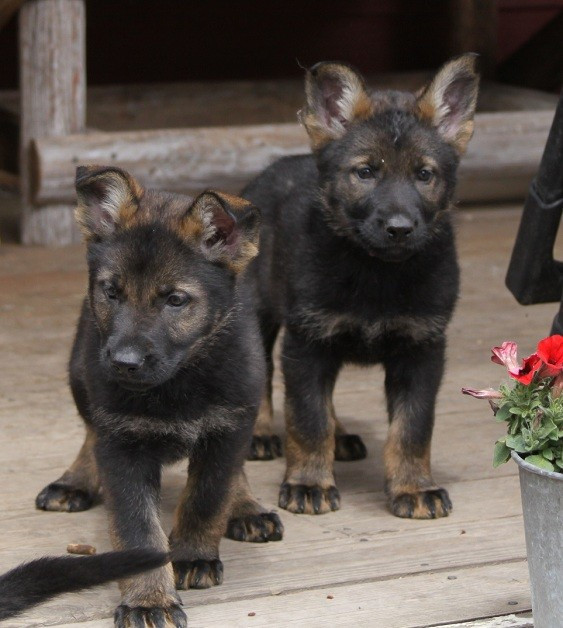
Congratulations,you are the proud new parent of a 8 week old German Shepherd Pup!
You have spent countless hours online first to locate the Breeder ,waited months for him to get here and have a fair amount invested in his purchase,his shipping,toys,collars and leashes.You want to do right by him,giving him the best food,training and health care but after reading all the online articles of what to do,what not to do.What to feed,what not to feed,vaccinations,neutering.....You are more confused then ever!
There's a lot of info out there that's very informative and a lot that's just ridiculous.And even 2 knowledgeable Breeders will do things differently then other and many will insist that their way is better.How do you decipher if you don't have the experience to know the difference? Listen to your Breeder.If you purchased a pup from them then you must trust their instincts and knowledge. It is in their best interest that your new pup has the best of everything. If the Breeder has been breeding awhile and has a established kennel with good references,repeat clients,feeds quality feeds has healthy dogs and is willing to take the time to explain why they do this or that,listen well because the knowledge they have is priceless.It is free to you but cost them thousands upon thousands of dollars and a lot of blood,sweat and tears to get that knowledge. Good Breeders LOVE,LOVE,LOVE it when you ask questions.It shows us you care about your dog and want to do the best by him.
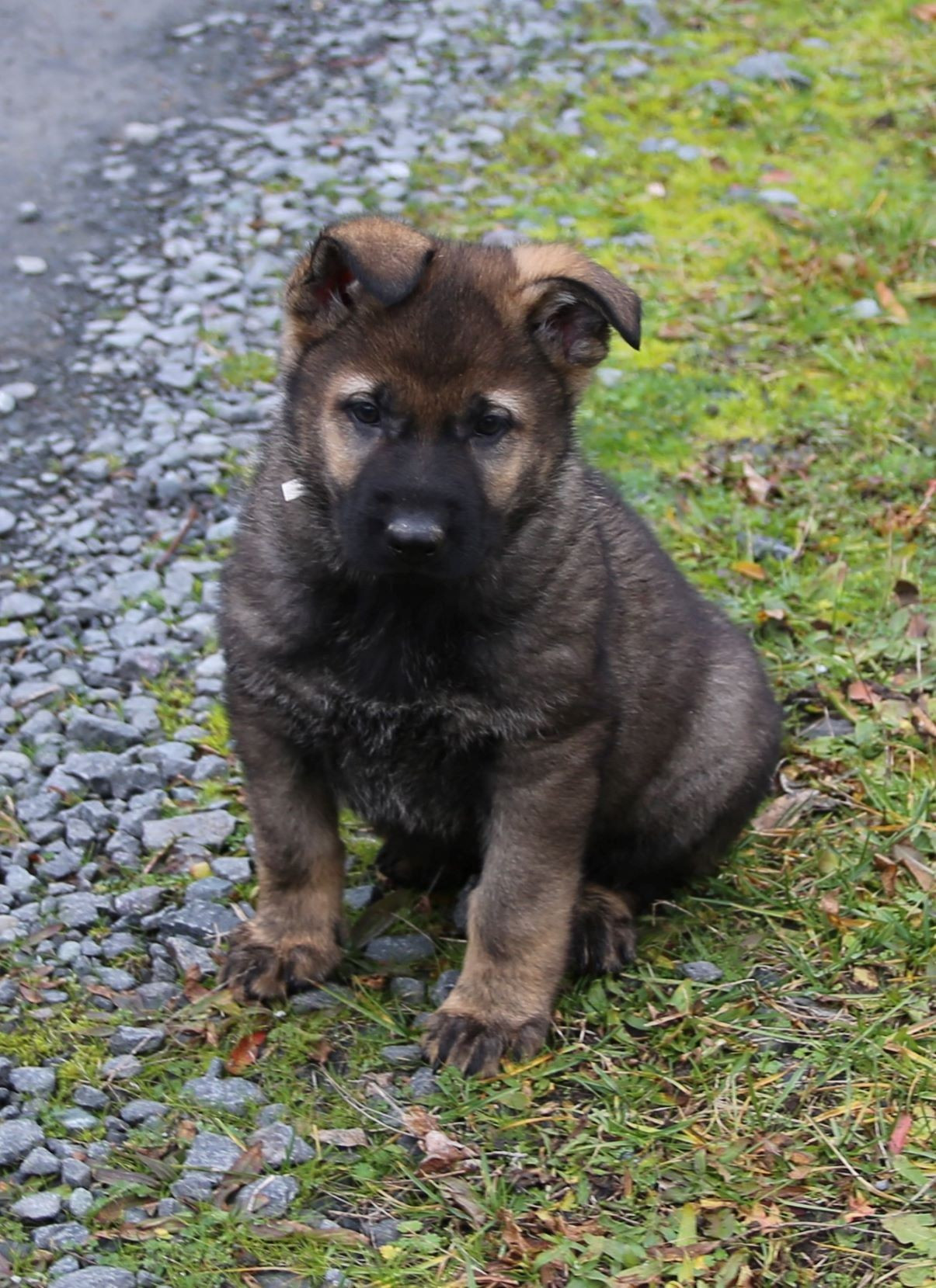
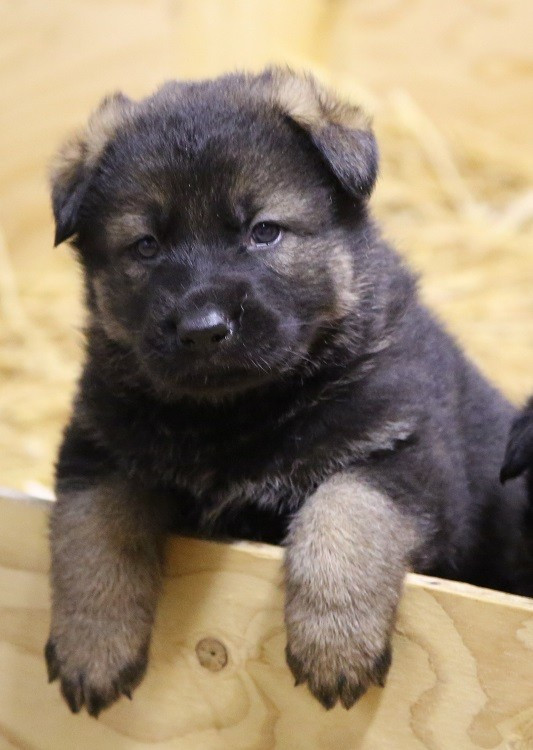
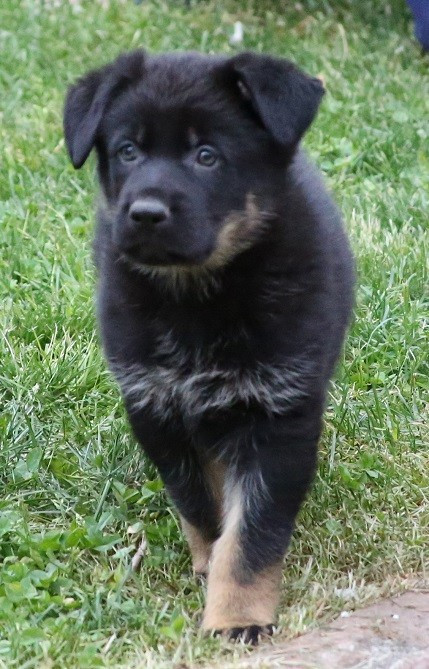
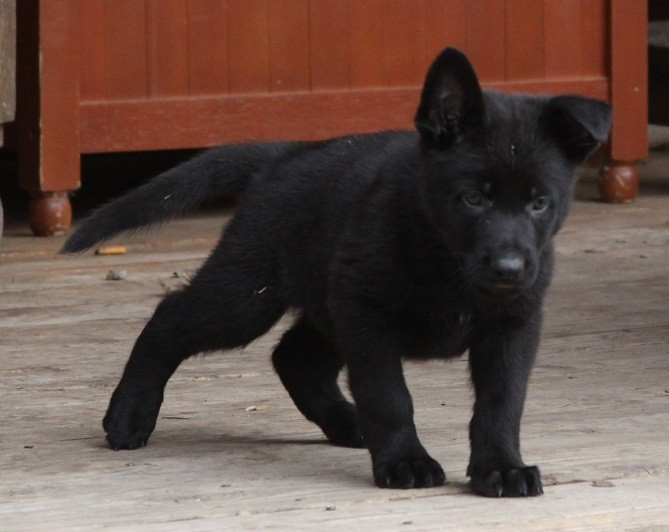
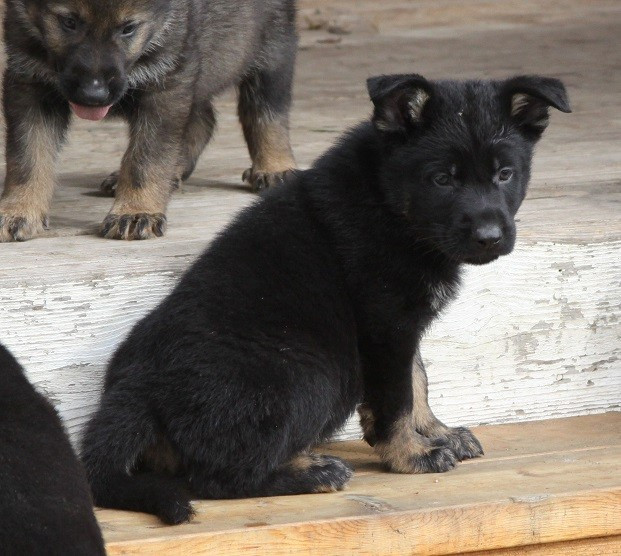
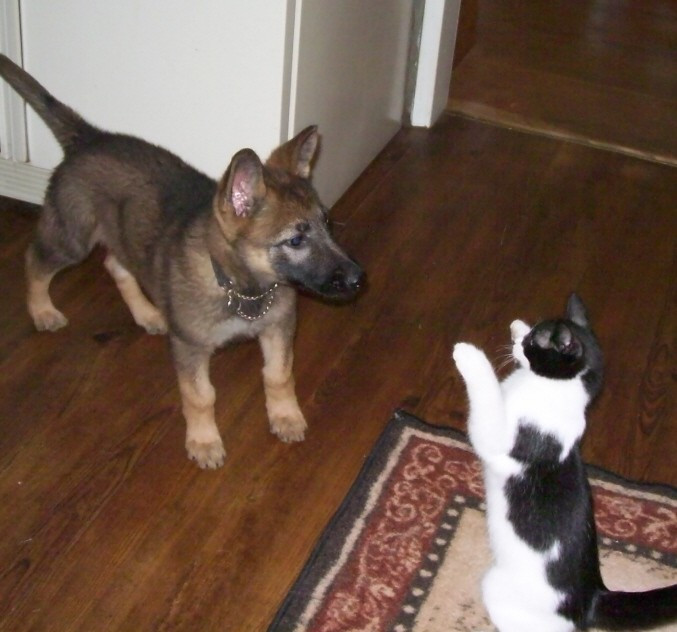
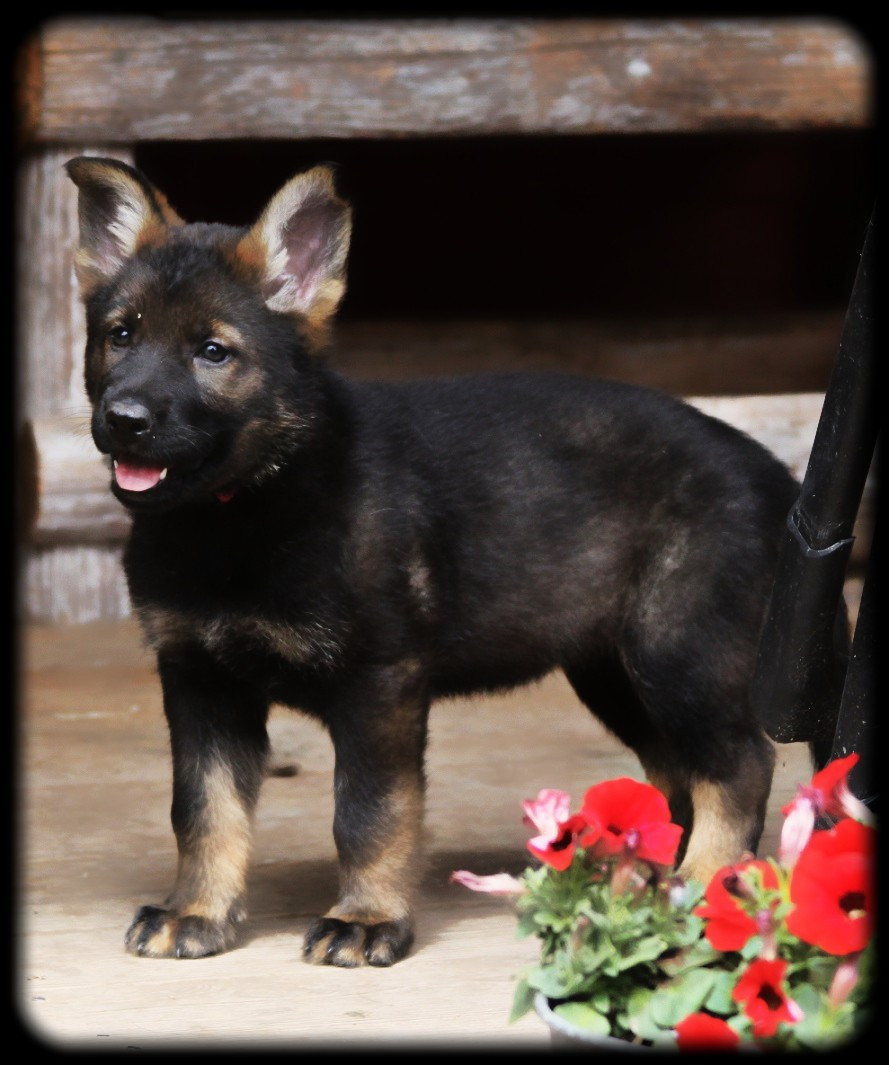
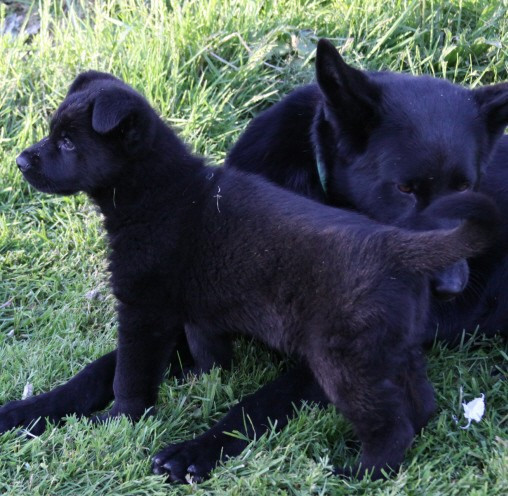
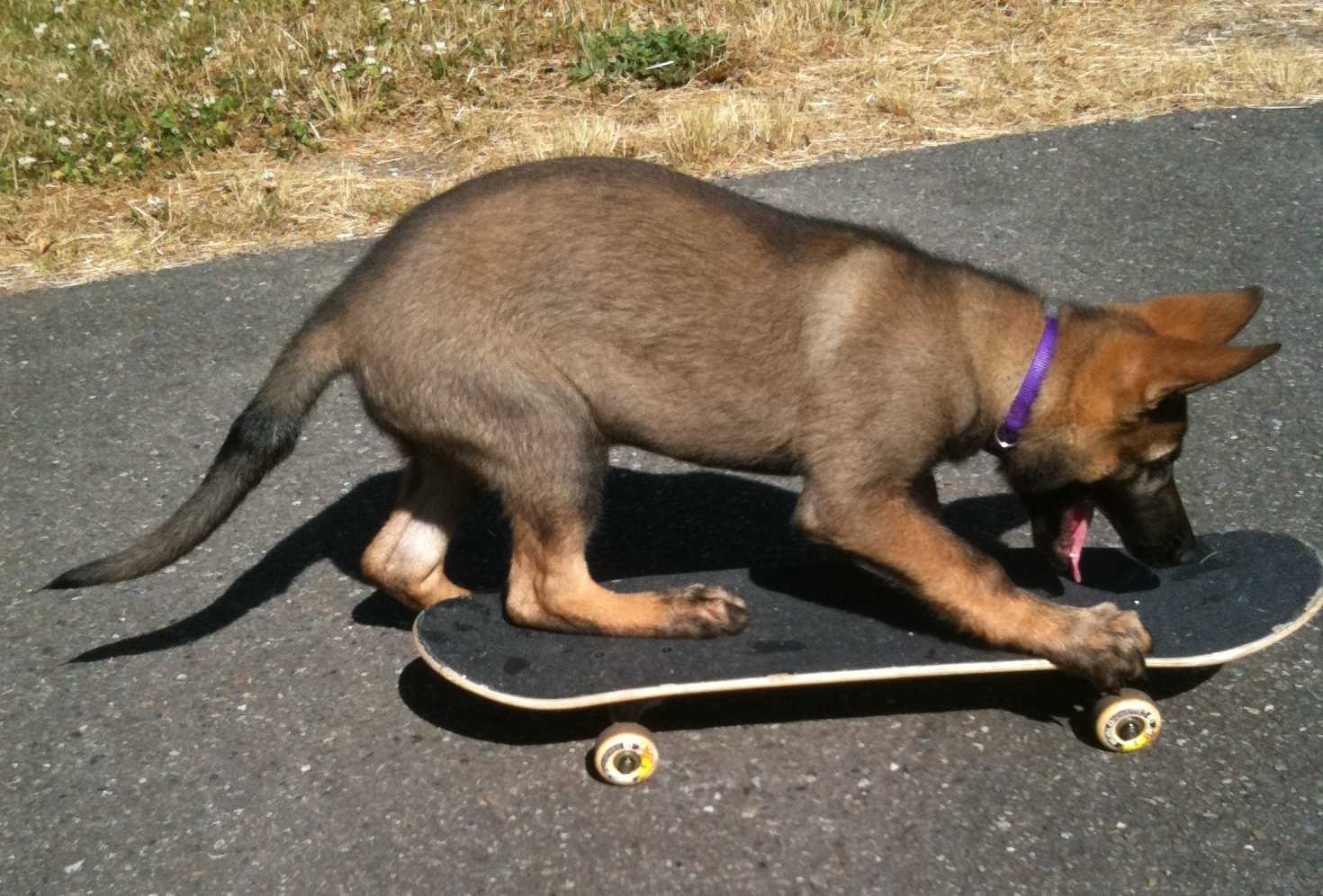
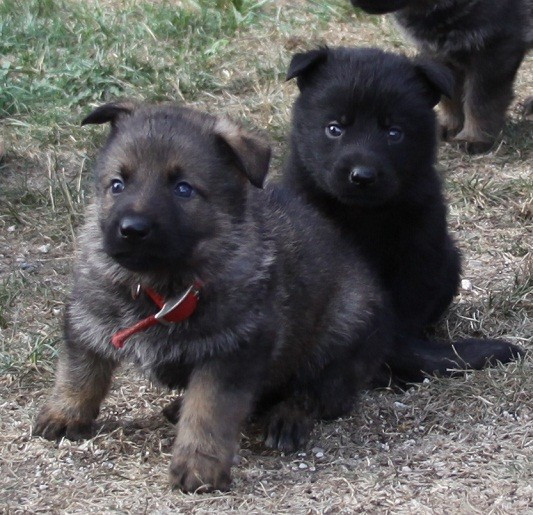
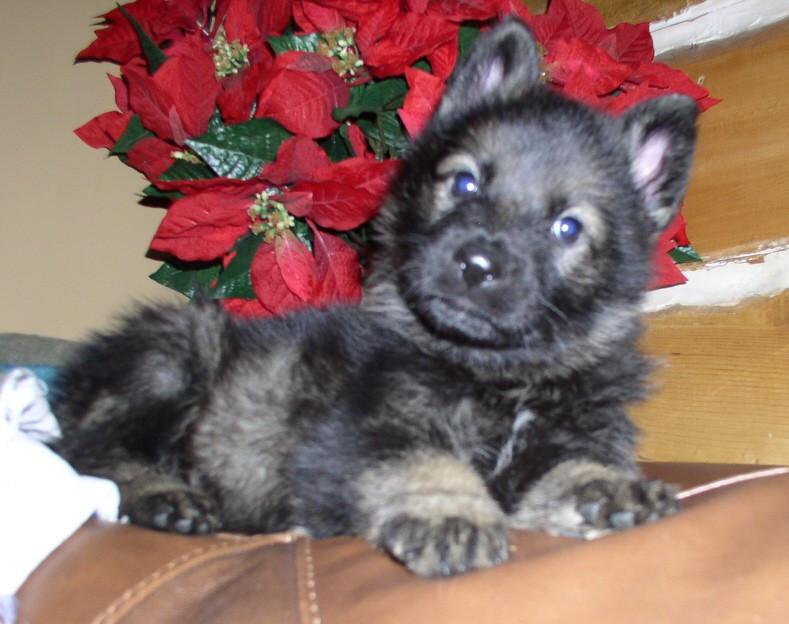
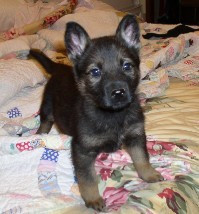
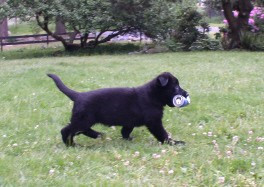
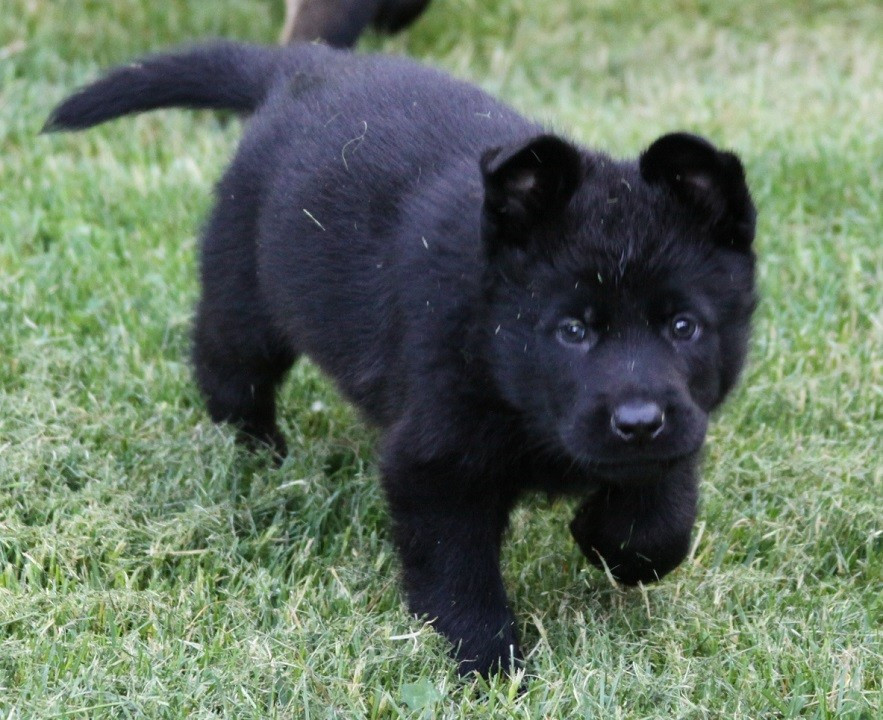
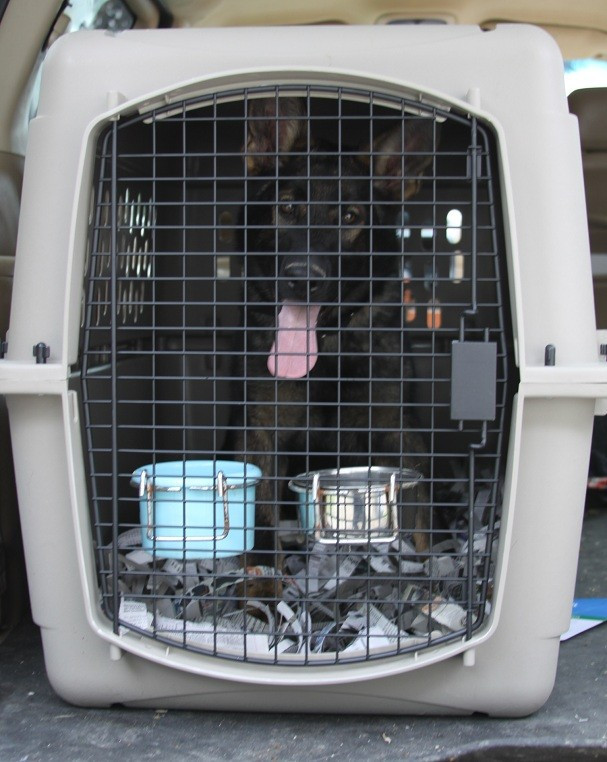 Crate Training
Crate Training
Thank goodness that most of the general public has come around to understanding and embracing this.I've been breeding long enough to remember when everyone thought they were cruel and you were for using them! Dogs are den animals and once they become accustomed to the crate, they happily go in it.
Crate training serves several purposes.First, it helps to housebreak by keeping the pup contained to a space that is its den and they do not want to soil their den. Second it provides a safe,secure place to put the pup when you are not home and third,it teaches the pup that being separated from you is ok, you will come back
A lot of well meaning people think they're doing better by their pups by spending every second with it and they are actually setting themselves up for having a dog with separation issues in the future.they need to learn separation from you will not harm them,that you will return.It is for the good of both Owner and Pup as adult dogs that have never been crate trained or kenneled will destroy a crate or do damage to themselves trying to get out of a kennel. A crate trained dog can go anywhere safely.You can take your dog on vacations and leave your dog in its crate in the motel room while you shop or dine.You can travel by air and take your dog and if your dog is ever injured or needs surgery that requires him to be confined,He will do so without protest or risking further injury. It does not have to be a something that you do for the life of the dog but the imprinting of teaching the pup when its young is most critical.Some people like wire crates,some like the plastic crates.I prefer the latter but both work equally well. click on the button to To read a great article on crate training and housebreaking.
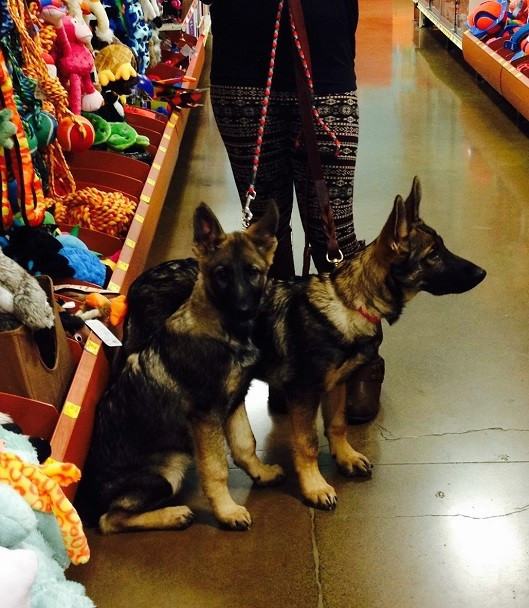
The most important thing and key to well balanced dog.Exposing your pup to many different sites,smells and sounds as a youngster teaches them to adapt,accept change,interact with people ,overcome obstacles thereby giving him confidence and making him a better, well rounded dog. Socializing is important to do with any breed but especially German Shepherds because the combination of their Intelligence,sensitivity,protective and suspicious nature,its crucial. I often give my clients the analogy of baking. My Pups have all the best ingredients in them from their bloodlines and how they were raised up to the point they leave, but ingredients mean nothing if you don't bake the cake correctly.The socialization is the baking. It can be started as you get the pup at 8 wks by going for car rides,visiting friends or relatives with dogs that have had their vaccinations and will be safe to introduce your pup .If you have concerns or don't know if their dog will be ok,do NOT introduce them.Its not worth the risk.If they have a bad experience at this age it can effect them forever. Bonding with you,meeting new people and learning his place in your "pack" is most important right now. At this time the pup has had only one vaccination so He is still at risk of contracting diseases.This means do not take your pup to public parks, pet stores,dog parks,puppy classes and No play dates with other pups until He has at least 2 vaccination (10 weeks).
Pet Stores,feed stores, Home Depot, School play yards,etc. Encourage him to approach people ,asking their permission of course,and allow people to pet him or give him a treat. .Make socializing a fun,happy adventure,give him obstacles to climb like stairs,different surfaces like docks or grates.Never forcing the pup into a situation that is scarey but instead allowing him see,smell and investigate it on his terms.Do not pet him when He's afraid as this only reinforces that fear.Staying calm,non reactive to his fear doesn't add energy to the situation & helps his mind process the situation better.Using treats makes it easier and helps get past the fear too. With young pups There's a fine line between socialize and terrorize So use common sense in your socializing and don't forget He is a Baby..For instance,Taking your young pup to the gun range or nitro drag strip is not ok. It will scare him & be counter productive to what you were trying to accomplish.Possibly creating a fear/anxiety that didn't exist prior. I also do not ever recommend dog parks.Not for adults and certainly not pups. Dogs running in packs can behave very badly and a pup is a easy target.Its not worth the risk. If You don't know if a situation is age appropriate for him,ask your Breeder. Most reputable Breeders sell their pups with the guarantee of Lifetime Support and would rather have you call and ask the question then to risk exposing the pup to something He is not mentally old enough to handle.
For a great resource on socializing your pup,check out this website The Puppy Socialization Plan
Feeding
At 3 wks of age We start Our Puppies on a mixture or gruel of Organic Baby Rice Cereal & Goats Milk. As the pups mature we start to mix in a soaked grain-free kibble and phase out the baby cereal. We slowly add raw at 5 wks by hand feeding.With kibble we add or top dress with a bit of Honest kitchen Thrive. By the time the pups are 8wks of age they're on hard kibble(not soaked) augmented with raw.I only use Natures Instinct Raw and prefer the lamb. The reason I like the prepackaged raw is because I like to know exactly what's in the food..ingredients,protein ratio,etc and of course,it's easier:)There are many excellent brands of high quality Grain free food but we prefer Sportdog food. It is a huge misconception that pups need puppy food-this just a marketing ploy. I feed my pups 2 x a day unless its a large litter,then its 3 x. I recommend my Clients only feeding 2x a day. If you're feeding a great food, this enough. More then that is unnecessary and it makes it harder to house break. Do not ever free feed! Not only does it start bad eating patterns,you cant tell if they've gone off their feed and that's crucial info to know. It couldbe a sign of a problem.One of the best reasons to feed your dog yourself at set times is that the act of feeding your dog is one of the things that establishes you as the boss.The next is to regulate amount of food and establish a ritual.Dogs need routine in their lives too and feeding effects everything from crate training,housebreaking and sleeping through the night. As a society,Americans tend to grossly overfeed their pets and most do not need as much food as you think they do.
Vaccinations and deworming
We worm the pups 4,6 and 8wks of age Pyrantel Pamoate and vaccinate at 7wks of age. We administer these ourselves and provide Our Clients with a Health Record containing what was given and when and The labels from the Vaccine viles are attached also. There's additional de-worming and vaccinations that need to be done by your Veterinarian at interval over the next 6 months. We have always felt strongly about vaccines and the over use of them and thank god,the info is finally out that backs this up. We recommend the next Vaccinations at 10 and 13wks. Rabies at 20 wks or older if you can. Given again at 1yr but do not do the combo at same time,try and do it at least 1 mo apart. After that do titer counts.Most vets offer this
Naming and Registration
All of our pups come with either AKC Ltd Registration or Full Registration Applications.This means they are eligible for Registration.The Litter has been registered by the Breeder,signifying parents,DOB & number of pups but the Puppy is not yet individually registered until the new owner signs it and sends it via mail or completes online.We utilize the German Alphabetical method of naming our pups.This means the registered name of every pup in the litter will begin with the same letter,followed by our kennel name.For example Ava von dem Waldkonig. The next litter born will be the next litter in the alphabet and so on. We allow our Clients to be a part of picking the name as long as it begins with that Litter letter,its not silly or contains another kennel name. We put the name on the registration papers and if it is changed at all,the Warranty for that dog is completely Void. Why can't you name your own dog? You can.You can call your dog anything you like.Most people use a call name,not the registered name anyway. But the Pups Registered name is a brand of where He came from.He is a product of a mating the Breeder thought of, paid for financially,physically and mentally and is a Breeders blood,sweat,tears & love for the Breed in the flesh. It's no different then any other company putting their "logo" on their items and is the only way we can do so. es at the same time,try and do it at least 1 mo apart. After that do titer counts.Most vets offer this

What to expect~ Puppy Proofing and Feeding
So you've finally got your new German Shepherd puppy home at last. You have the food,the toys,collar and leash,the crate and the booklet provided by the Breeder with helpful hints on all you are about to embark on. But the booklet doesn't cover such things as;
Why is my puppy whining all the time? Is He ok?
Help ,my Puppy chews on everything and bites Me all the time!
He doesn't like his crate,He screams when He's in it.
He isn't interested in his food.
"My Vet says".......
Puppy Whining- Dogs are Pack animals.They are domesticated now but the structure and hierarchy that makes a wolf pack ,still exists in our modern dogs. The pack is now the people and other dogs in your dogs immediate family. In the wild the pack structure is life. The pack unit together is strong.
It can sustain itself because all members have a purpose and a place.They are safe from starvation or danger because they have each other to hunt with and watch over. Your new puppy came from a place where He knew He was safe.He had a Pack,had structure and knew the rules even at such a young age.Then its time to leave all of that and go to his new home. He is ,in his mind, very vulnerable.He hasnt yet bonded with you as his Alpha and protector and this can sometimes cause some anxiety whining. Usually their curious GSD mind and drives will move them past this quite quickly but if you do see your pup exhibiting this behavior,just ignore it.Do not try and comfort as this actually can feed this behavior and make it worse. Ignore it and it too shall pass as He settles into your Pack and you begin to bond. Keeping a schedule will help this along also.
Chewing- Like every baby,puppies are curious. The only thing they have to experience taste & texture is their mouth then add teething to that and GSD puppies can be piercing little holes in everything,including you! Households that plan to bring a new puppy home need to puppy-proof just as you would baby-proof. If you have young children,make sure the puppy does not have access to their rooms or make sure all small items that can easily be swallowed are always picked up. This includes stuffed animals-your pup will destroy them and it would surprise you how quickly.
Pick up catfood and cover or move the catbox and move any houseplants that He may have access to. The easiest way to puppy proof is to
use baby gates,they're a godsend! You can often find these 2nd hand at Thrift stores or Craigslist for a fraction of the cost. When your pup is out of the crate having free time,He must be watched at all times. When interacting with you ,if He tries to bite you, try redirecting the focus to a toy. This may or may not work.If the pup insists, try holding the muzzle while firmly saying "no".Then try to redirect again. Your pup may object to your discipline and bark back. Say "no" to the objection too. This is not aggression,the pup is merely playing but He still needs to know what is and isn't acceptable to you,the Pack Leader. This "mouthy" period can be a trying time but with patience and structure,you will get through it. If you have young children,teach them to be calm around Puppy and not to scream and run when playing with him.The high pitched voices excite him and all He has to play "tag" with is his mouth.A GSD is a herding Breed ,they love nothing better then the chase game but this can lead to bad habits.Best to let them throw a ball for him(supervised) or even play hide and seek with him. This is great fun for both and provides both physical and mental exercise for the pup-the latter actually being more exhausting. Puppy proofing is not limited to the house ,make sure your yard is safe.Do not use any pesticides,herbicides ,or bait of any kind-EVEN if it says its safe for pets.Its not worth it. If your pup has access to where your car is parked,make sure to watch for antifreeze or coolant leaks and that any chemicals or poisons are up out of reach. Give the pup access to plenty of chew toys. We prefer the smoked knuckle bones as they smell great to the dog and encourage chewing. Kongs or other hard rubber chew toys stuffed with peanut butter are good too as are hooves and antlers. Do not give your pup cooked bones of any kind as they can splinter.Even a young pup can crush a large steak bone into little pieces easily. Raw beef bones are ok when the pup is a bit older but I find the marrow too rich for younger pups. Do not give rawhide or rope as chew toys as they can ingest larger pieces. Do not leave "squeaky" toys with the pup unsupervised. It doesn't take long for a pup to rip a hole in the toy ,risking swallowing the squeaker. Gastrointestinal obstruction in puppies is a very common problem seen by Vets.If caught quickly,surgery can be performed with success but time is of the essence .Left unchecked,is fatal. Usually these things can easily be prevented by proper puppy proofing and allowing access to safe toys/chews only.
Feeding -The first week the pup is at his new home He is going to be a bit out of sorts. Everything is new to him. He has to learn a routine,a schedule that will give him some structure. Structure is life to a Pack animal. At first,He may walk away from food to see what you're doing, the cat walked in, the phone rang...puppies are easily distracted. The goal is to get them to eat all their food ,then go outside to potty.
Because they are so easily distracted,I recommend isolating the pup at feeding time. Crate is best but anywhere where He cant see you so easily and will focus on eating will do.At first,He will cry, spill his food, throw a fit,etc ,but soon everything will fall in place. Use vocal cues while preparing the food such as "dinner" or "hungry?" . If He doesn't eat all his food,pick up the rest. Until you get your feeding routine established only use the kibble that you have him on as his treats. Integrating into a new home or "pack" as your puppy sees it,is stressful to them in so much as they have no structure yet in the new home. Start for day one keeping the same routine. Most pups fall right in to your routine in about a week.Some may take longer but keep the routine and rest assured,your pup will come along. The crate is a wonderful tool that I highly recommend. Some folks still see the crate as cruel but that is very outdated mindset and is just simply not true! A canine is a den animal.This means they like to sleep or rest in a secure "den like" space, a small enclosed space so nothing can sneak up on them. Then they will lie facing the front to spot danger. Just because the dog is domesticated, doesn't mean they do not still "den". The crate is useful for ;
Teaching puppy bladder/bowel control (potty training)
Feeding in a enclosed space so that your pup cant be distracted so easily and eats all his food.
Providing a place for a safe place for him to be at night or if you have to leave the house for a short time.
Crating your dog is also the safest way to travel with your dog.
When beginning crate training , there's no way around the inevitable screaming and crying that comes with it. We all have different lifestyles, work schedules, kids schedules,etc. So there is no hard and fast rule to crate training -except one....never let the pup out while hes carrying on or you just taught him how He can get let out !
Some people want to keep the pup in their room,next to the bed and if that works,great. Some people sleep in another room away from their spouse with the crated puppy,fine. I personally crate train my pups in the kennel building.
